Politics
Hamas studies new Gaza ceasefire proposal
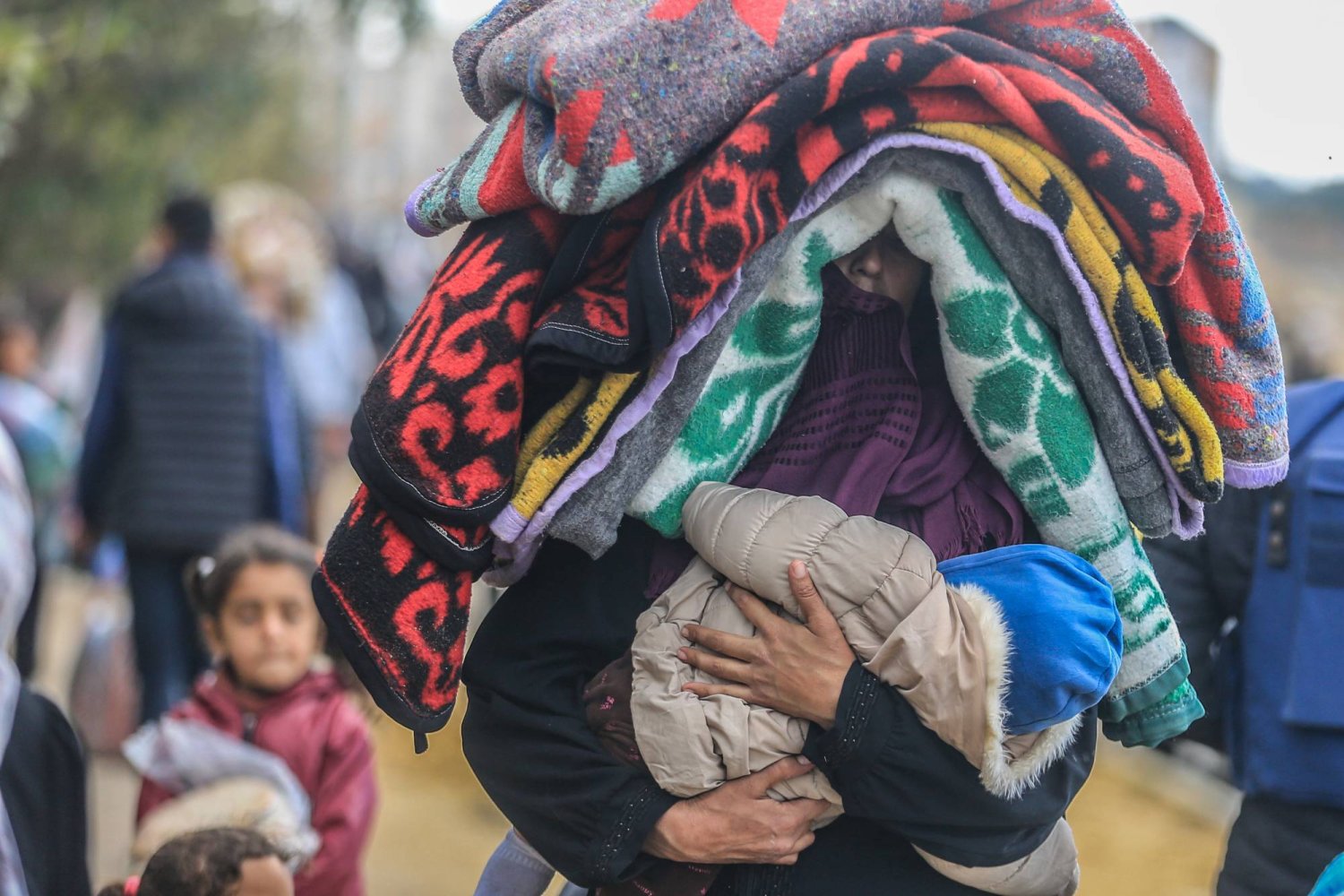
Hamas said on Tuesday it would study a new ceasefire proposal in the war with Israel in Gaza, hours after Israeli commandos killed three Palestinian militants in a raid on a hospital in the occupied West Bank.
The raid underscored the risk of the Gaza war spreading to other fronts, while Israeli forces fought new battles with Hamas fighters in the Palestinian enclave.
Clashes in northern Gaza forced more Palestinian residents to flee to safer areas, and southern parts of the coastal enclave were hit by Israeli air strikes.
Hamas leader Ismail Haniyeh said the group had received a ceasefire proposal put forward after talks in Paris. Haniyeh said he would study the plan and visit Cairo to discuss it.
The priority for the Palestinian militant group was to end the Israeli offensive and a full pull-out of Israeli forces from Gaza, he said.
Haniyeh gave no details of the ceasefire proposal but it followed talks in Paris involving CIA Director William Burns, Qatar’s prime minister, the chief of Israel’s Mossad intelligence service and the head of Egyptian intelligence.
While the West Bank – an area that Palestinians envisage as part of a hoped-for independent state – had seen increased violence even before the outbreak of the Gaza war in October, the hospital raid could fuel a more intense phase of unrest.
CCTV footage appeared to show about a dozen troops, including three in women’s garb and two dressed as Palestinian medical staff, pacing through a corridor in Ibn Sina hospital in the city of Jenin with rifles.
Hamas said one of the dead was a member of the militant Islamist group. The allied faction Islamic Jihad said the other two killed were brothers who belonged to it. Ibn Sina said one of the brothers had been receiving treatment for an injury that paralysed his legs.
The Israeli military said one of those killed had a pistol, and that the incident showed militants were using civilian areas and hospitals as shelters and “human shields”. Hamas has previously denied such allegations.
Palestinian sources said the three were not engaged in any fighting. They said one, Basel Al-Ghazzawi, was wheelchair-bound after being wounded in his back this month, and was in the hospital for treatment. His brother Mohammad was staying there to help him, and the third man was a friend, the sources said.
The Israeli undercover squad broke into the hospital, headed to the third floor and killed them using silenced pistols, hospital sources said.
“They executed the three men as they slept in the room…in cold blood, by firing bullets directly into their heads inside the room, where they were being treated,” hospital director Najy Nazzal said.
Palestinian Health Minister Mai Alkaila called the incident a war crime and urged the United Nations and international rights groups to put an end to such actions. Israel has previously denied committing war crimes.
The Israeli military identified one of the slain men as Mohammed Jalamneh, 27, from Jenin, who it said had contacts with Hamas headquarters abroad and was planning an attack inspired by the Hamas rampage in southern Israel on Oct. 7.
DEATH TOLL RISES
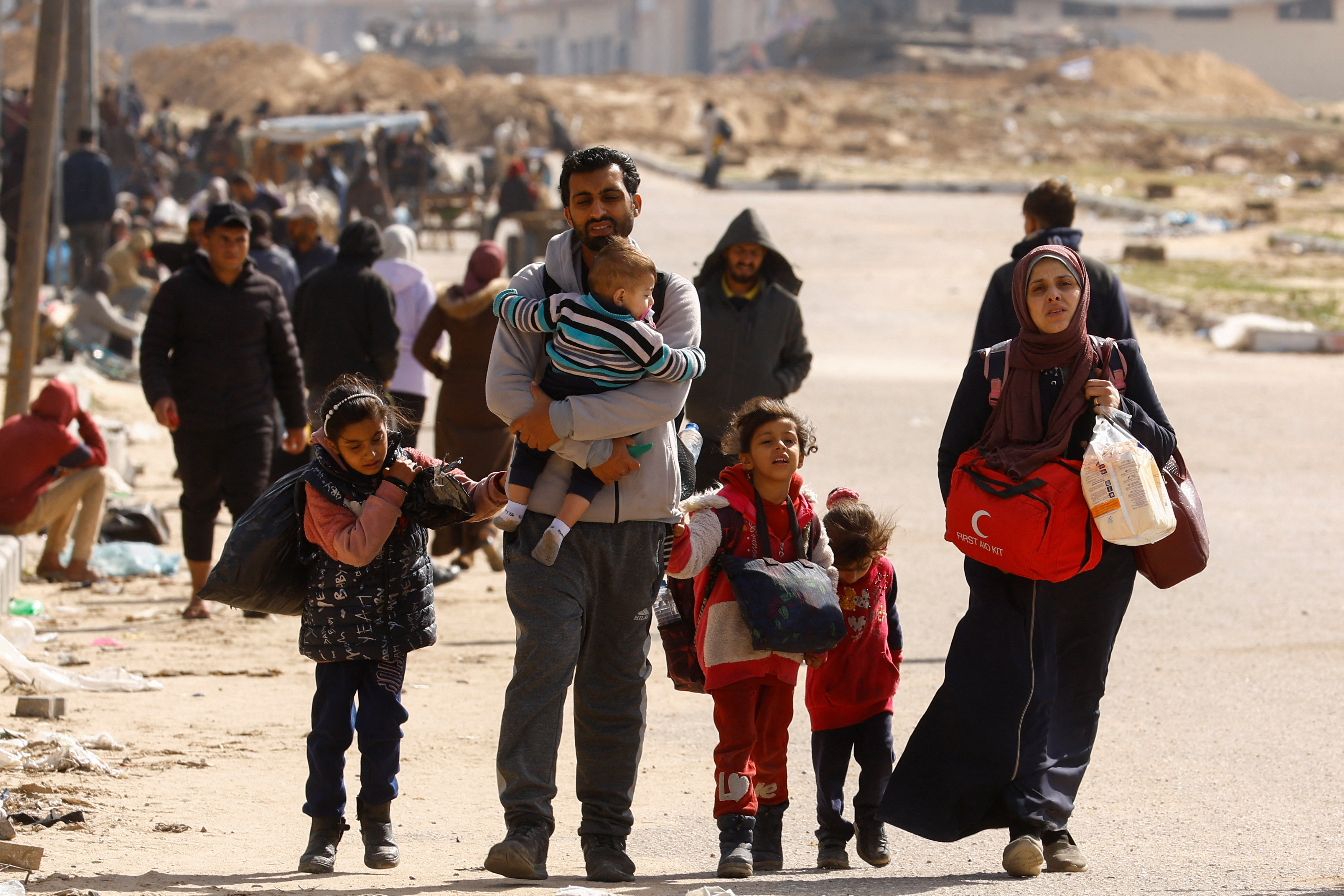
Palestinians, fleeing Khan Younis, move towards Rafah, during the Israeli ground operation against Palestinian Islamist group Hamas, in the southern Gaza Strip, January 30, 2024. REUTERS
Israel unleashed its assault on Gaza in response to that attack in which 1,200 Israelis were killed and 253 taken hostage. More than 100 hostages remain captive in Gaza.
Since then, 26,751 Palestinians have been killed and 65,636 wounded by Israeli actions in Gaza, the Gaza health ministry said. Some 114 Palestinians were killed and 249 injured in the past 24 hours, it said.
Israel says its forces have killed around 9,000 Palestinian combatants in Gaza, and that 221 of its soldiers have been killed in the fighting.
The war has created a humanitarian crisis, with wide areas of Gaza flattened, hundreds of thousands of people left destitute, and supplies of food, water and medicines almost exhausted.
The World Health Organization said the population of Gaza was on the verge of famine.
“It’s getting worse by the day,” WHO spokesperson Christian Lindmeier told a briefing in Geneva.
One convoy tried to reach the Nasser Hospital on Tuesday morning but people helped themselves to supplies before they could be distributed, he said.
Health Minister Alkaila said epidemics were spreading through Gaza and health conditions were catastrophic due to a shortage of medics, equipment, medicines and facilities.
She warned of the dangers of decomposing bodies under the rubble, which were helping spread epidemics.
TANKS IN ACTION
Israel mounted a new push in northern Gaza after earlier reporting successes against Palestinian militants there. The militants’ presence in the area suggests Israel’s campaign to eradicate Hamas is not going to plan.
Much of Tuesday’s action in Gaza was focused on the Beach refugee camp and near the Al Shifa hospital, residents said. Israeli tanks broke into one shelter site and soldiers rounded up dozens of men.
Residents and health officials also said an Israeli tank opened fire against dozens of Palestinians near Al-Kuwaiti Square on the southern edge of Gaza City where aid trucks unload their shipments, killing two people and wounding others.
The fighting caused more people to flee within Gaza City and to the south towards Deir Al-Balah in the centre.
In the south, Israeli forces kept up pressure in Khan Younis, maintaining their encirclement of the city’s two main hospitals.
The Palestinian Red Crescent said Israeli tanks were firing near the Al-Amal Hospital and a Red Crescent office in Khan Younis, killing one person and wounding nine.
The Israeli military said in a summary of overnight operations that action continued in the western part of Khan Younis, where militants were killed and many arms seized. In northern and central Gaza, soldiers killed “numerous” militants, including a rocket-propelled grenade squad.
© Reuters
Current Affairs
New survey points to coalition-led SA, but voter apathy a major factor
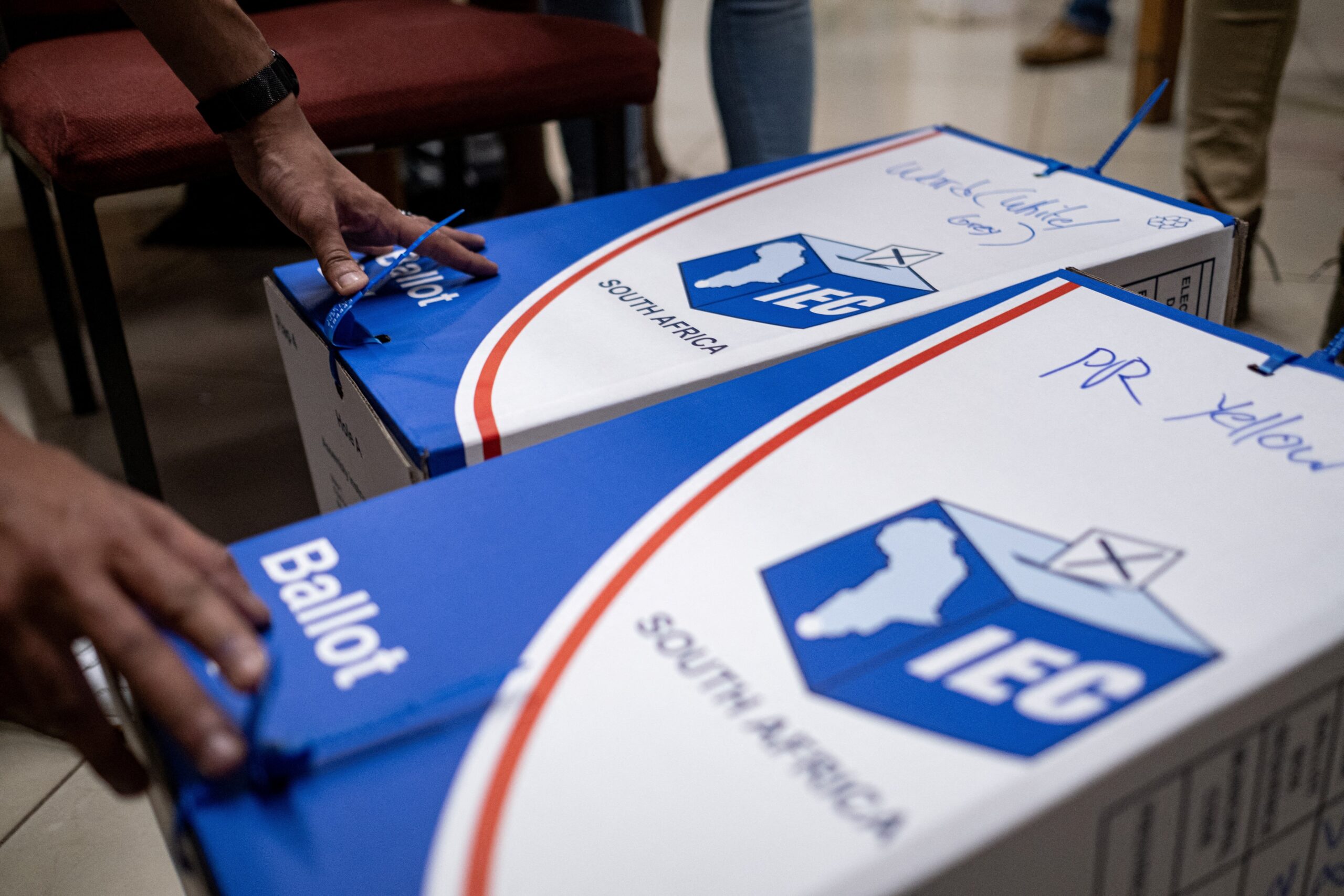
The results of an in-depth survey conducted by African Innovation Research SA (AIRSA) point to the country’s future being in the hands of coalitions and raise concerns about voter apathy, especially among the youth.
The initial sample comprised some 5 000 participants, of whom 46% confirmed they were either not interested in voting despite being registered or had not registered.
The majority of those surveyed by the independent research company based in Cape Town were in the 18–35 age group, a generation who are increasingly disillusioned with how the country is run.
The remaining 2 700 participants, who were interviewed from across a broad section of South Africa’s nine provinces, indicated that support for the ruling ANC is in decline, dipping below the 50% mark to 43% overall.
The ANC’s strongholds remain the Eastern Cape (61% of those surveyed), 58% in the Free State and 65% in Limpopo, where its challenger is the EFF at 23.7%.
In the country’s fourth-largest economy, Mpumalanga, the ANC leads with 52.3%, the EFF at 21.7% and the DA at 19.7%.
In the North West province, it’s a similar pattern, albeit reversed, with the ANC at 48.3%, the DA at 27.7% and the EFF at 20.0%, while in the Northern Cape, the ANC leads with 47.3%, followed by the DA with 24.3% and the EFF with 15.7%.
The country’s economic engine, Gauteng, is a key player in the power dynamics. Here, the ANC garnered 38.7%, but the EFF is growing its base to 19.3%, challenging the DA’s 20% of the province’s voters.
In the Western Cape, as expected, the DA holds onto a leading margin at 46.0%, with the ANC and EFF at 22.3% and 8.7% respectively. Gayton McKenzie’s Patriotic Alliance (PA) also features in the country’s southernmost province, making a notable showing at 5%.
While former president Jacob Zuma may have been barred from becoming a member of Parliament in the Constitutional Court this week, the new uMkhonto weSizwe Party (MKP) will play a pivotal role in KwaZulu-Natal. Results of the AIRSA survey show that while the ANC currently remains ahead with 28.7%, it’s an even race in the province with similar support for the IFP at 26.0% and MKP at 26.7%.
As experience dictates, the smaller parties will begin a series of bargaining tactics as to whose deck they end up in and call the shots.
At collectively accounting for around 20% of the upcoming vote, these potential coalition partners carry significant influence.
AIRSA also noted that voting in this sector is personality-driven as opposed to ideology.
The fragmentation of South Africa’s political landscape could also contribute to increasing dissatisfaction and disillusionment, particularly when linked to the country’s youth and increasing unemployment.
© IOL (Cape Times)
Politics
Zuma lashes out at judges after election ban
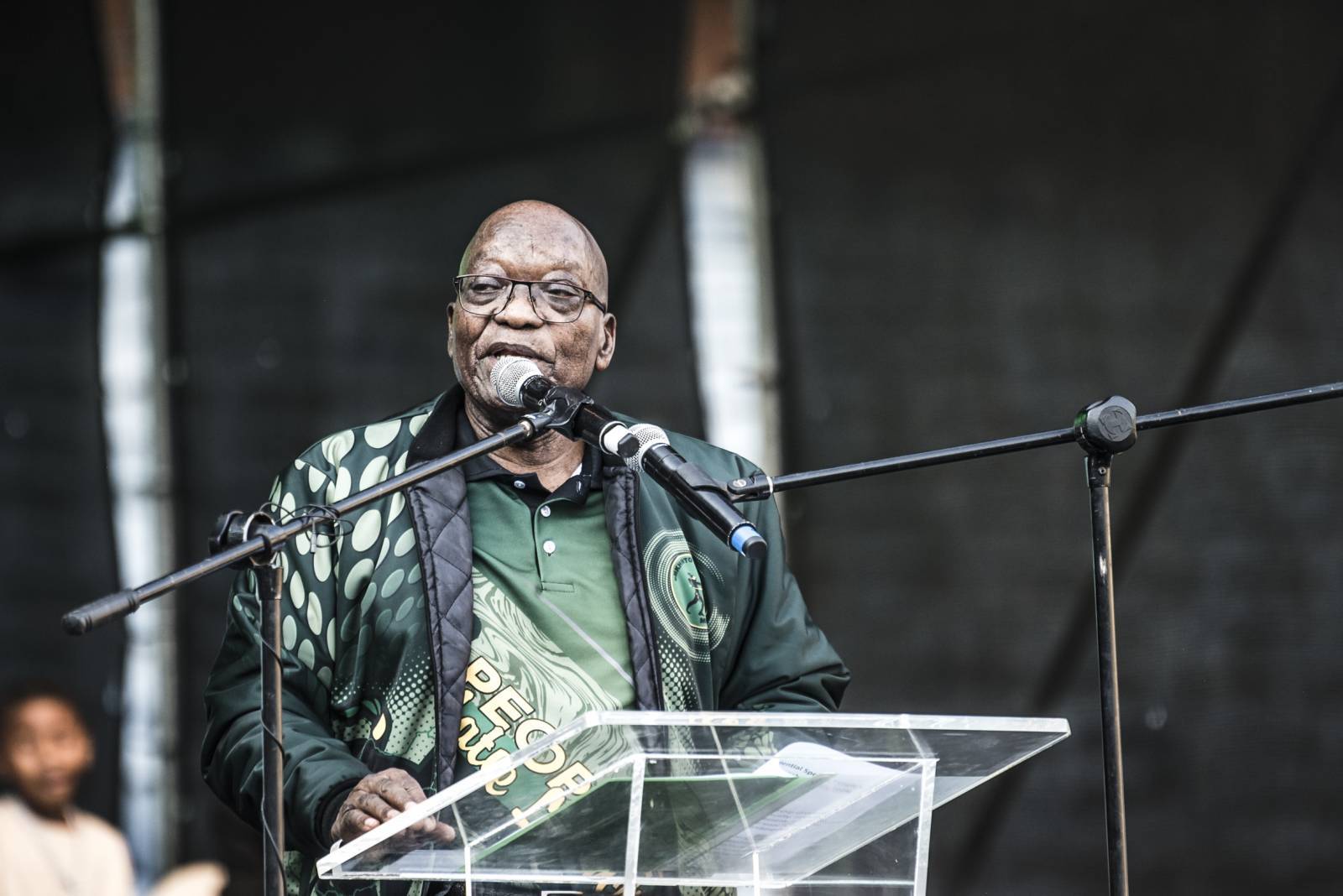
Former President Jacob Zuma has launched a scathing attack on some of the country’s top judges after he was barred from running for parliament on Monday.
In his first interview since the ban, Zuma told the BBC the Constitutional Court was wrong to decide he was unfit to run, based on his 2021 conviction for contempt of court.
“I expected that from our judges, but they are definitely wrong. Not correct,” the 82-year-old said, adding that the constitution should be changed.
Ahead of next week’s general election, Zuma had been campaigning under the banner of the newly formed uMkhonto weSizwe (MK) party.
He joined the party after falling out with the governing African National Congress (ANC), which he used to lead.
The electoral commission argued that the constitution bars anyone who was sentenced to more than 12 months in prison from serving as a lawmaker – a view backed by the Constitutional Court judges.
Zuma was convicted in 2021 for refusing to testify at an inquiry investigating corruption during his presidency.
His lawyers had insisted he was entitled to become an MP as his sentence was reduced to three months after current President Cyril Ramaphosa released him from prison in what was widely seen as an attempt to placate the former president’s angry supporters.
“The judges of the Constitutional Court have acted very funny to me – towards me in particular,” Zuma told the BBC.
“They are not taking into account the will of the people of this country, they use their own will.”
He was president from 2009 to 2018 before being forced out as leader of the ANC amid allegations of widespread corruption in his government.
The corruption, widely known as “State Capture”, saw hundreds of millions of rands of public assets taken into private hands. Zuma has always denied any direct role in corruption, but is due to face trial next year on allegations of bribery.
He told the BBC he had been wrongly stripped of his role as leader of the ANC.
“I don’t know what ‘State Capture’ means. If people say I am corrupt, what did I do? Do you have any facts about it? Am I guilty?
“I was removed before the end of my term, and nothing was produced as evidence that this was an issue.”
Zuma’s MK party had previously voiced its desire to change South Africa’s constitution, which was drawn up 30 years ago at the birth of the country’s democracy following decades of white-minority rule.
Asked about this in the light of his election ban, Zuma reiterated that the historic document needed to be changed.
“This constitution in the continent of Africa is guided by the laws from Europe, not us,” he said.
“There is nothing that has come right in this continent because we are still dominated by those who were the ones [who] slaved us, and after slavery, oppressed us, and after oppression, put their own laws to run us.
“There are details that clash with our lives.”
An Ipsos opinion poll released last month gave MK 8% of the vote, and the ANC 40% as it loses support to MK and other opposition parties.
But some analysts suggest that with the governing party stepping up its campaign in recent weeks, it could still cross the 50% mark. But if the ANC gets less than half of the vote, it would lose its majority for the first time in 30 years.
MK is expected to do especially well in Zuma’s home region of KwaZulu-Natal. Some opinion polls suggest it could emerge as the biggest party in KwaZulu-Natal, ending ANC dominance of the region.
After Zuma was jailed for contempt of court in 2021, angry supporters sparked days of deadly riots. More than 300 people were killed in the clashes.
On Wednesday Zuma said this violence demonstrated the scale of public support for him.
“This must tell you that the masses of this country loves Zuma – that’s why we had that,” he said.
When asked by the BBC if he would use this interview to call for peace and calm ahead of next week’s election, Zuma replied: “I’ve always done so.”
© BBC News
Current Affairs
Iran’s supreme leader leads prayers at Raisi funeral
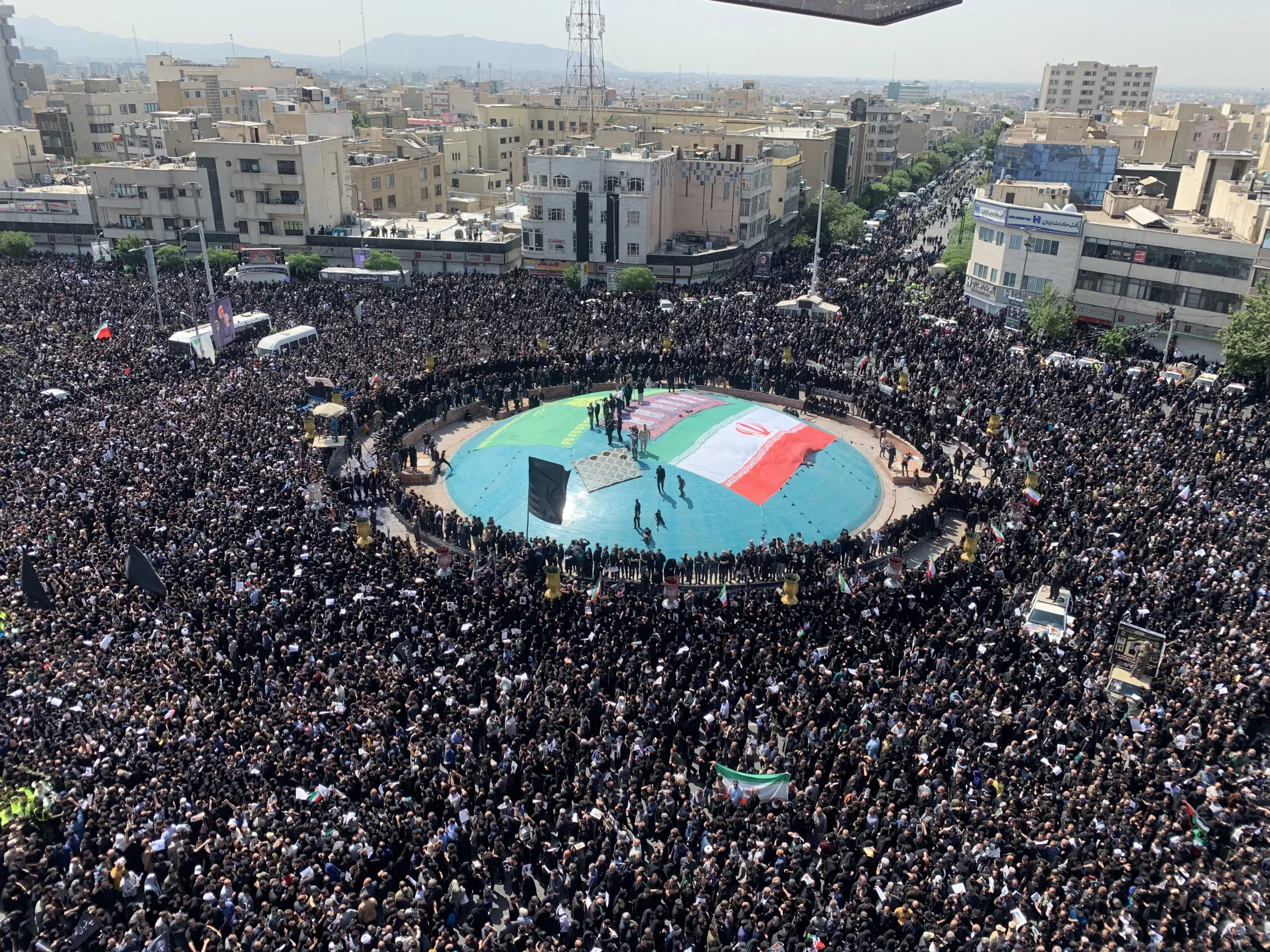
Iran’s supreme leader has presided over a funeral for the country’s late president, foreign minister and others killed in a helicopter crash on Sunday.
Ayatollah Ali Khamenei led prayers at Tehran University, where caskets carrying the dead were draped in Iranian flags.
President Ebrahim Raisi died alongside Foreign Minister Hossein Amir-Abdollahian and six others in a helicopter crash near the border with Azerbaijan.
Authorities had warned against demonstrations against the funeral procession and insults posted online.
“Oh Allah, we didn’t see anything but good from him,” Ayatollah Khamenei said in the standard prayer for the dead in Arabic.
Iran’s acting president, Mohammad Mokhber, stood nearby and openly wept during the service.
People then carried the coffins out on their shoulders, with chants of “Death to America” heard outside.
They loaded them onto a trailer for a procession through downtown Tehran to Azadi Square, where Raisi gave speeches in the past.
In attendance were top leaders of Iran’s paramilitary Revolutionary Guard, one of the country’s major power centres.
Also on hand was Ismail Haniyeh of Hamas, the militant group that Iran has armed and supported during the ongoing Israel-Hamas war.
Haniyeh is widely considered Hamas’s overall leader and has been a prominent member of the movement since 1980. The US Department of State designated him a terrorist in 2018.
“I come in the name of the Palestinian people, in the name of the resistance factions of Gaza…to express our condolences,” Haniyeh said.
He also described meeting Raisi in Tehran during Ramadan, the holy Muslim fasting month.
He said he heard the president say that “the Palestinian issue” remains the key one of the Muslim world, which “must fulfil their obligations to the Palestinians to liberate their land”.
He also claimed that Raisi called Hamas’ October 7 attack in Israel, which saw 1,200 people killed and 250 others taken hostage, an “earthquake in the heart of the Zionist entity”.
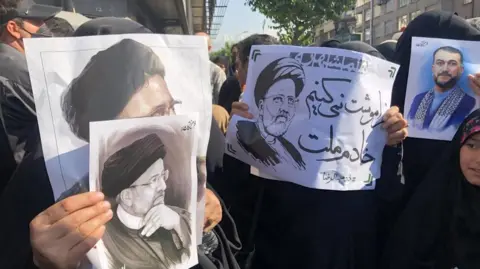
Also expected to attend services in Tehran were Pakistan’s Prime Minister Shehbaz Sharif and a delegation from the Taliban of Afghanistan, which included their Foreign Minister Amir Khan Mutaqqi.
Iran’s theocracy declared five days of mourning over Sunday’s crash, encouraging people to attend the public mourning sessions.
Typically, government employees and schoolchildren attend such events en masse, while others take part out of patriotism, curiosity or to witness historic events.
For Iran’s Shiite theocracy, mass demonstrations have been crucial to demonstrating the legitimacy of their leadership since millions thronged the streets of Tehran to welcome Grand Ayatollah Ruhollah Khomeini in 1979 during the Islamic Revolution, and also attended his funeral 10 years later.
An estimated one million turned out in 2020 for processions for the late Revolutionary Guard General Qasem Soleimani, who was killed in a US drone strike in Baghdad.
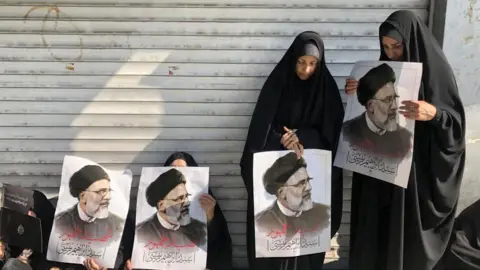
Across the capital, large banners were raised hailing Raisi as “the martyr of service”, while others bade “farewell to the servant of the disadvantaged”.
Some residents in Tehran received texts urging them to attend Wednesday’s ceremonies, the AFP news agency reported.
Footage carried by state TV showed streets filled with mourners, many of whom were carrying pictures of Raisi or the Iranian flag.
Funeral rites for the men began on Tuesday in the city of Tabriz and the Shiite clerical centre of Qom, where thousands of mourners attended ceremonies.
After Wednesday’s procession in the capital, Raisi’s remains will be moved to South Khorasan province, before being transferred to his home city of Mashhad in the northeast.
He will then be buried on Thursday evening in the city after funeral rites at the Imam Reza shrine.
Raisi, a hardline cleric, was a highly divisive figure in Iran. In the 1980s, he oversaw the execution of scores of opposition activists while working as a prosecutor.
He unleashed a brutal crackdown against demonstrators angered by the killing of 22-year-old Mahsa Amini in 2022. She died three days after she was detained by morality police in the capital for allegedly violating Iran’s strict rules requiring women to cover their hair with a hijab, or headscarf.
But his ultra-conservative outlook won favour with supporters of the regime, and Raisi was viewed as a possible successor to Ayatollah Khamenei.
© BBC News
Politics
Ireland to recognise Palestinian state
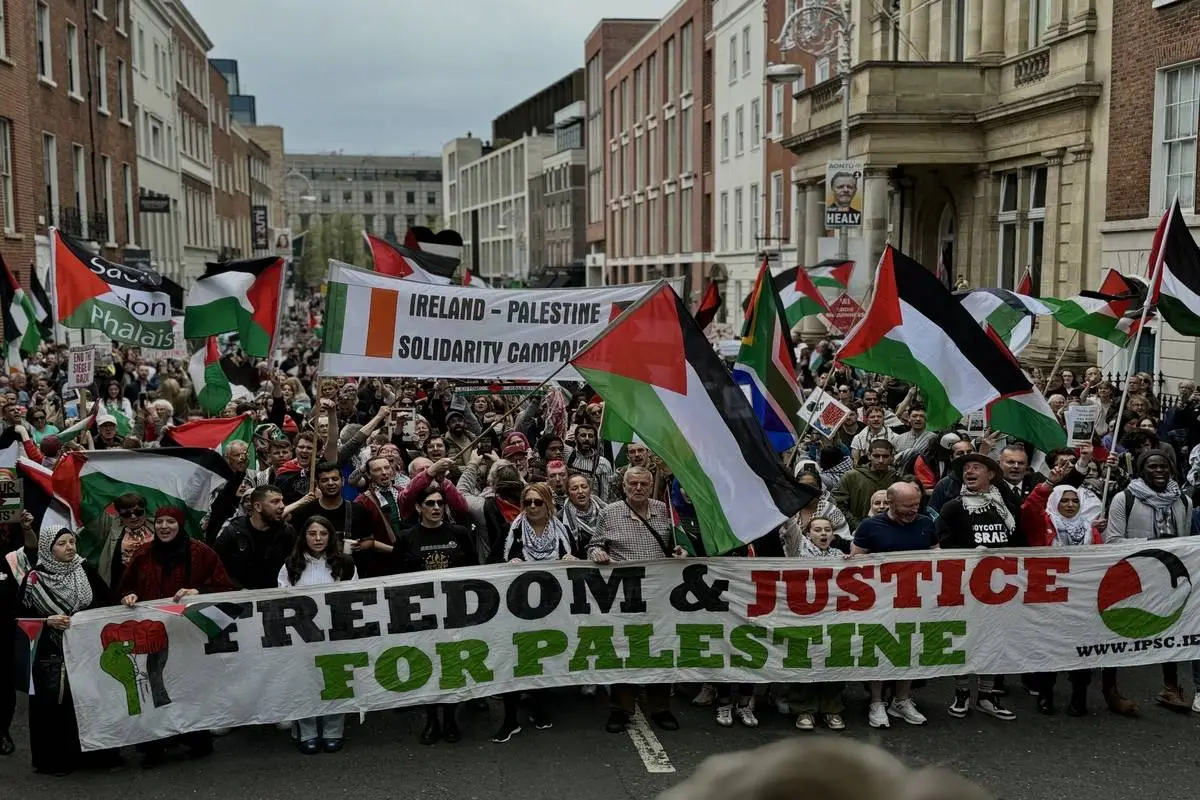
Ireland will recognise a Palestinian state, Prime Minister Simon Harris said on Wednesday, adding that he expected other countries to follow in the coming weeks after talking to world leaders.
“Today, Ireland, Norway, and Spain are announcing that we recognise the state of Palestine,” Harris said at a press conference.
“In the lead up to today’s announcement, I’ve spoken with a number of other leaders and counterparts and I’m confident that further countries will join us in taking this important step in the coming weeks,” he added.
He said a two-state solution was the only credible path to peace and security for Israel, Palestine and their peoples.
The recognition of statehood has particular resonance in Ireland given its history, Harris said.
“Taking our place on the world stage and being recognised by others as having the right to be there was a matter of the highest importance for the founders of our state,” he said.
He added that Ireland was unequivocal in fully recognising Israel and its right to exist “securely and in peace with its neighbours”, and he called for all hostages in Gaza to be immediately returned.
Ireland’s recognition of Palestine will be formally enacted on May 28, foreign minister Micheal Martin said on X.
© Reuters




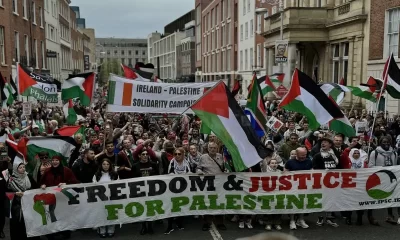

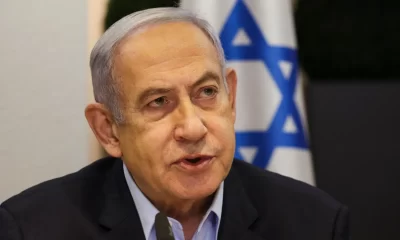

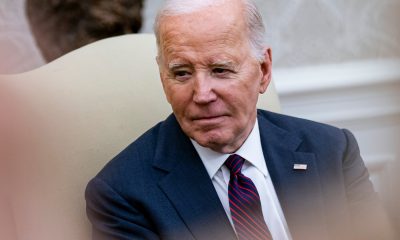

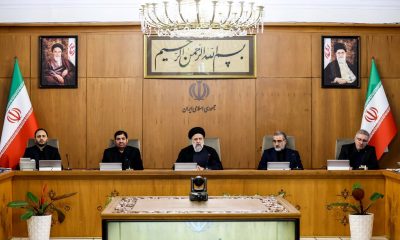








You must be logged in to post a comment Login